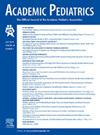The Latino School Readiness Gap: Engaging Families in Design Thinking for Primary Care Interventions
IF 2.8
3区 医学
Q1 PEDIATRICS
引用次数: 0
Abstract
Objective
Among Latino families with a recent kindergartener, we 1) qualitatively explored school readiness (SR) journeys and 2) used design thinking to understand their preferences, usability, and acceptability of primary care–based SR interventions (checklist, coordinator, coaching, texting, preschool, library referrals, parenting groups, and Reach out and Read).
Methods
Focus groups and interviews were completed at 4 Oregon pediatric clinics over 2 sessions: 1) narrative inquiry of SR stories through journey maps and 2) SR intervention assessment through design thinking. Sessions were led by an English/Spanish bilingual-bicultural facilitator, recorded, and transcribed. Iterative team–based coding with inductive analysis was conducted in the source language.
Results
Participants (N = 33) were primarily Spanish-speaking (58%) mothers (76%) born in Mexico (64%) with at least a high school degree (69%), with US-born children (55%) who attended preschool (81%). Journey maps revealed a positive educational foundation of teaching values, culture, and language for kindergarten preparation, with strong beliefs that school will teach life skills. Compared to English-speaking parents, Spanish-speaking parents focused more on social-emotional development than specific early literacy or math activities, reporting less confidence in teaching cognitive skills. Parents identified a longitudinal model with SR interventions at multiple points. Themes regarding targeted SR support, hesitancy to request help, and bilingualism were integrated into a prior framework to promote SR (Figure).
Conclusions
Participating families encouraged school success in their children before kindergarten and focused on social-emotional, cultural, and linguistic development. Caregivers identified a variety of acceptable and feasible clinic–based SR interventions that build on Latino families’ social strengths.
拉丁裔入学准备差距:让家庭参与初级保健干预的设计思维。
目的:在最近有孩子上幼儿园的拉丁裔家庭中,我们1)对入学准备(SR)旅程进行了质性探索;2)使用设计思维来了解他们对基于初级保健的SR干预措施的偏好、可用性和可接受性(检查表、协调员、教练、短信、学前教育、图书馆推荐、父母小组和接触和阅读)。方法:在俄勒冈州4个儿科诊所进行焦点小组和访谈,分为两个阶段:1)通过旅程地图对SR故事进行叙事探究,2)通过设计思维对SR干预进行评估。会议由英语/西班牙语双语双文化主持人主持,录音和转录。在源语言中进行了基于团队的迭代编码和归纳分析。结果:参与者(N=33)主要是西班牙语(58%)母亲(76%),出生在墨西哥(64%),至少有高中学历(69%),美国出生的孩子(55%)上过学前班(81%)。旅程地图揭示了一个积极的教育基础,即教育价值观、文化和语言,为幼儿园做准备,并坚信学校将教授生活技能。与说英语的父母相比,说西班牙语的父母更注重社交情感发展,而不是具体的早期识字或数学活动,他们对教授认知技能的信心更低。家长确定了一个纵向模型,在多个点上进行了SR干预。有针对性的SR支持、请求帮助的犹豫和双语能力等主题被整合到先前的促进SR的框架中(图1)。结论:参与调查的家庭鼓励孩子在上幼儿园前在学校取得成功,并关注他们的社会情感、文化和语言发展。护理人员根据拉丁裔家庭的社会优势确定了各种可接受和可行的基于临床的SR干预措施。
本文章由计算机程序翻译,如有差异,请以英文原文为准。
求助全文
约1分钟内获得全文
求助全文
来源期刊

Academic Pediatrics
PEDIATRICS-
CiteScore
4.60
自引率
12.90%
发文量
300
审稿时长
60 days
期刊介绍:
Academic Pediatrics, the official journal of the Academic Pediatric Association, is a peer-reviewed publication whose purpose is to strengthen the research and educational base of academic general pediatrics. The journal provides leadership in pediatric education, research, patient care and advocacy. Content areas include pediatric education, emergency medicine, injury, abuse, behavioral pediatrics, holistic medicine, child health services and health policy,and the environment. The journal provides an active forum for the presentation of pediatric educational research in diverse settings, involving medical students, residents, fellows, and practicing professionals. The journal also emphasizes important research relating to the quality of child health care, health care policy, and the organization of child health services. It also includes systematic reviews of primary care interventions and important methodologic papers to aid research in child health and education.
 求助内容:
求助内容: 应助结果提醒方式:
应助结果提醒方式:


